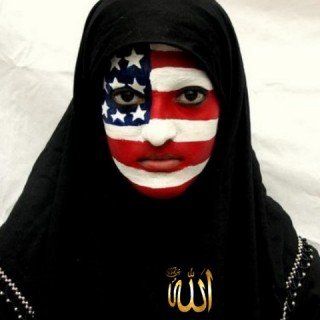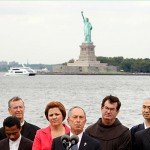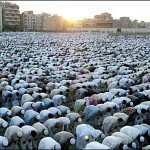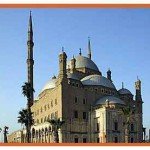
After 9/11 attacks, islamophobia began to take shape in the collective consciousness of the American and western general public.
But for the American Muslims it was a lot more than viewing this antipathy on TV, they were living it, day in and day out
By Dr. Ashraf Ezzat
Exchange among civilizations is a tremendous source for the creation of value and most of all, the value of diversity and tolerance
Human history is replete with disasters brought about by attitudes of arrogance and superiority complex based on race, color, language and religious affiliation.
And the latter has been the example of the latest uproar over what is called Ground Zero mosque in lower Manhattan, New York.
The New York Landmarks Preservation commission on Tuesday denied landmark status to a building near the World Trade Center site, freeing a group to convert the property into an Islamic community center and mosque that has drawn national opposition.
The Landmarks Preservation Commission voted 9-0, saying the 152-year-old building – two blocks from the site of the Sept. 11 terrorist attacks -wasn’t special or distinctive enough to meet criteria to qualify as a landmark
Thus the Islamic community that hopes to build a $100 million mosque and Islamic center near Ground Zero has cleared an important hurdle – the legal approval to build on the site. But they still have to overcome a fierce and seemingly insurmountable hurdle which is the growing American antipathy toward the so called Ground Zero mosque.
What makes the problem almost insurmountable is the deeply and painfully misconceived history upon which it has to stand.
In the opponents view, building a mosque so close to the site of the Sept. 11, 2001 terrorist attack on the World Trade Center disrespects the memory of those killed. Supporters of the plan argue that building the center and mosque would be the ultimate test of the nation’s commitment to tolerance and religious freedom.

Mayor Michael Bloomberg underscored this freedom in a passionate defense of the center this week: “The World Trade Center site will forever hold a special place in our city, in our hearts. But we would be untrue to the best part of ourselves and who we are as New Yorkers and Americans if we said no to a mosque in lower Manhattan. Any way, the emotions this debate has ignited are intense and contradictory.
National and New York politicians and public protestors have come out in recent weeks against plans for the mosque, saying that pushing to build a conspicuous Muslim institution near this site demonstrates a profound lack of emotional intelligence and understanding of the raw emotions that are the legacy of the terrorist attacks.
Rationalization of bigotry.
Honest American citizens, who have come to know pure demagoguery when they hear it, have lately had, plenty of practice, listening to what opponents of the mosque project had to say.
First, former vice presidential candidate Sarah Palin, have argued against a mosque being so close to the scene of the nation’s worst terrorist attack. And added that, it would only lead to unnecessary provocation.
Mark Williams, chairman of the Tea Party Express, blogged about the 13-story mosque and Islamic cultural center planned at Park Place and Broadway, calling it a monument to the 9/11 terrorists.
The Anti-Defamation League, an organization that battles anti-Semitism and other forms of bigotry, in a contradicting statement, is asking that the Islamic centre and mosque be built farther away from ground zero in consideration of families who lost loved ones during the Sep 11, 2001 attacks.
Meanwhile, in a statement that reflected the ultimate demagoguery, Republican running for Governor Carl Paladino released a video statement on Monday saying he would stop the mosque if he was elected.
[youtube zLLrd79aOqI&feature=player_embedded]
The real reason behind the debate over Ground Zero mosque
“We had Islamic fundamentalists who killed 3,000 people at the World Trade Center site and are trying to kill more since then, so to have a Mosque at that site will stir up feelings – and antagonistic ones,” says Douglas Muzzio, a professor of political science at Baruch College in New York. in this statement, Prof. Muzzio simply summarized the problem behind the furious debate on this mosque issue.
People are against this project, not because it is at Ground Zero, but simply because Muslims are behind it. And Muslims – in the back of the Americans` mind – are considered the perpetrators of the 9/11 atrocities.Terrorism is not an ideology, it is a tool; but the terrorists kill for an ideology. They call that ideology Islam. This is the direct message that the mainstream media insisted on delivering in the aftermath of 9/11.

The American public did not bother to question this weird narrative. A terrified post 9/11 public needed a suspect, a villain to point the finger at, and that evil force that aimed to destroy America was already tailored and prepared- in the white house political kitchen – as Islam.
Thus with the 9/11 attacks a new era of growing antagonism to other creed began to emerge in a way never witnessed since the fall of communism, and islamophobia began to take shape in the collective consciousness of the American and western general public.
It is not at Ground zero and it is not a mosque.
To be accurate the Ground Zero mosque is not at Ground Zero. It’s near Ground Zero; leaving out the “near” clearly takes sides — against the “mosque” and against accuracy.
And furthermore, it is not a mosque, it is designed and planned to function as an Islamic cultural center under the label of Cordoba House Islamic cultural center (which is to include a prayer room — not a single-purpose house of worship for Muslims, which is probably what we should reserve the word “mosque” for.)
There’s no good reason why Cordoba House should be misleadingly called a “mosque. . It is designed as a multi-use complex with a space set aside for prayer — no minarets, no muezzin calls to prayer blaring onto Park Place.”
The world Muslim community numbers about 1.57 billion people, roughly one-fifth of the world population.
This community has to do their Friday prayer, gathered together in a house for prayer. Giving the knowledge that, an average mosque could accommodate around 200 people. How many mosques- in your opinion- should be built for the Muslims around the world?
If we do math, we will find that the Muslims are in need of a scary number of mosques to enable them to perform their prayer. But honestly speaking, this represents no problem at all to the Muslims.

For the Muslims, the earth is a big mosque, a Muslim can do his prayer rituals anywhere, in the open air or in a room, in land or at sea, standing or sitting and if he cannot move at all he could do it with his heart.
It’s not unfamiliar scene to watch the Muslims all around the world gathered in hundreds and thousands in the open air performing prayer and dispersing soon after they finish, leaving the place as it was before.
And if that is the case, then why the American Muslim community insists on building what the media called “Ground Zero mosque”. I think it is obvious now that they want to build something a lot more than a simple mosque, something they really need, something that is worth more than $ 100 million and worthy of all the hardship they have to endure to make this dream like project come true.
The need to prove the obvious
The Manhattan project is being spearheaded by the Cordoba Initiative and the American Society for Muslim Advancement. In other words, the American Muslim community.
The American Muslims were terribly affected by the attacks of 9/11; Muslims around the world had been troubled by the irritating and somehow indirect accusation of Islam, as a doctrine promoting terror and intolerance.
All the world Muslim community could get a glimpse of that growing western antipathy toward them through reading the daily papers and watching the news on TV screens. But for the American Muslims it was a lot more than viewing this antipathy on TV, they were living it, day in and day out.
And though 40 to 50 of the 9/11 victims were American Muslims, and though Muslims in America grieved with their fellow Americans. Still they couldn’t escape the stereotyping of all Muslims that was underway.
What is also clear is that any personal antipathy toward any given person ought not predispose us to assume that he is guilty. But the American Muslims were predisposed to feel suspects ever since 9/11.
The American Muslims knew for a fact, as president bush once said that, on 9/11, Islam had been high jacked by a bunch of crazy fanatics who happened to claim adherence to Islam.
The American community couldn’t live with this growing feeling of not belonging as they watched the post -9/11 proliferating xenophobia.
The American Muslims had to do something to change this negative attitude, they had to stand out from the mainstream and risk their comfort and maybe their reputation to defend what ought to be taken for granted, They had to convince the media and political establishment, and even the general public, that Islam did not attack the World Trade Center on September 11, 2001, sick and twisted men did.

They had to persuade them that it is unfair and even harmful to feel this antagonist way about a great culture and turn a blind eye to the valuable contributions of Islam to the world civilization throughout history.
They had to establish this “Cordoba cultural center” to initiate an interfaith and intercultural dialogue aimed at redefining Islam to the Americans. And putting an end to the absurd and deliberate scheme that helped characterize and link Islam and Muslims to terror.
And as Thomas L. Friedman, the New York Times columnist described opposition to this project as “resistance to diversity.”The proposed Islamic center should be considered as a symbol of tolerance in a free society. Only in such way, the building of the so called Ground Zero mosque could make a statement.
Civilizations have met, interacted and transacted with one another throughout history. The meeting of civilizations was not always a smooth phenomenon. But always proved a worthy endeavor.

Ashraf Ezzat is an Egyptian born in Cairo and based in Alexandria. He graduated from the faculty of Medicine at Alexandria University.
Keen not to be entirely consumed by the medical profession, Dr. Ezzat invests a lot of his time in research and writing. History of the ancient Near East and of Ancient Egypt has long been an area of special interest to him.
In his writings, he approaches ancient history not as some tales from the remote times but as a causative factor in our existing life; and to him, it’s as relevant and vibrant as the current moment.
In his research and writings, Dr. Ezzat is always on a quest trying to find out why the ancient wisdom had been obstructed and ancient spirituality diminished whereas the Judeo-Christian teachings and faith took hold and prospered.
Dr. Ezzat has written extensively in Arabic tackling many issues and topics in the field of Egyptology and comparative religion. He is the author of Egypt knew no Pharaohs nor Israelites.
He writes regularly at many well-known online websites such as Dissident Voice and What Really Happened.
Dr. Ezzat is also an independent filmmaker. His debut film was back in 2011 The Annals of Egypt Revolution and in 2012 he made Tale of Osiris a short animation for children.
In 2013 his short The Pyramids: story of creation was screened at many international film festivals in Europe. And he is working now on his first documentary “Egypt knew no Pharaohs nor Israelites”.
ATTENTION READERS
We See The World From All Sides and Want YOU To Be Fully InformedIn fact, intentional disinformation is a disgraceful scourge in media today. So to assuage any possible errant incorrect information posted herein, we strongly encourage you to seek corroboration from other non-VT sources before forming an educated opinion.
About VT - Policies & Disclosures - Comment Policy



